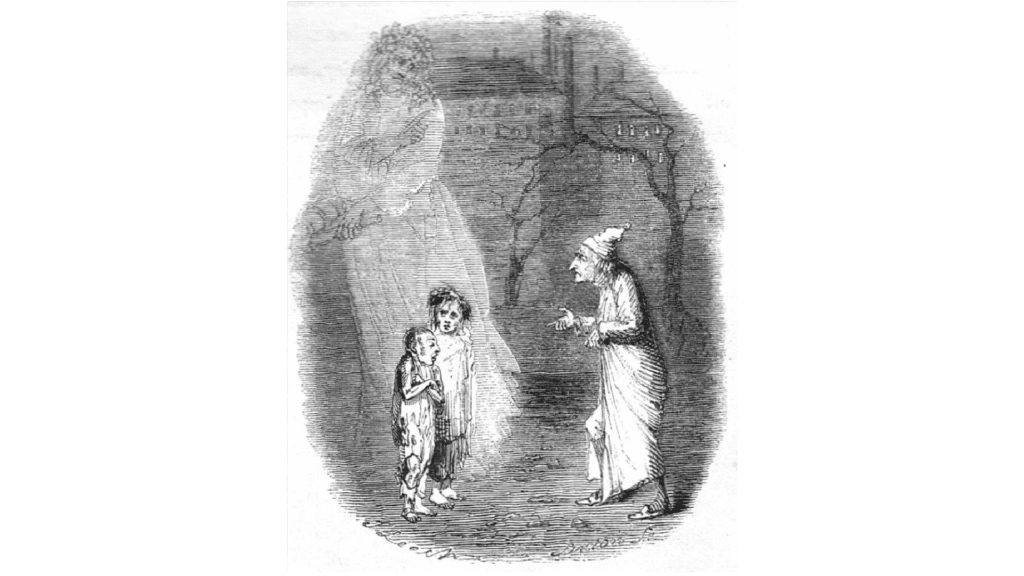Laura Eastlake, Senior Lecturer in English Literature at Edge Hill University, discusses how A Christmas Carol could be interpreted today in the current cost of living crisis.
Charles Dickens’s heart-warming tale of Ebenezer Scrooge and his encounter with the three ghosts of Christmas has been a staple story of the festive period since its publication in 1843. It seems to spawn a new film adaptation every year, from the magical Muppet version in 1992, to Netflix and Apple TV producing competing adaptations in 2022.
Yet amongst the feel-good, all-singing, all-dancing musical numbers, it is easy to forget that the novel itself was born from a period when social inequalities were becoming so rapidly and painfully pronounced that it became known as the ‘Hungry Forties’. As the industrial revolution gathered steam and privately-owned factories and mills expanded, millions of workers moved into urban centres which were often cramped, unsanitary, and lacking in infrastructure. Government legislation in the form of the Factory Reform Acts and the New Poor Law of the 1820s and 30s failed to curb poverty and widening social inequality. Instead, some of the loudest calls for change came from the literary world.
A Christmas Carol is a close relative of the genre of fiction called ‘Condition of England’ novels. Heavy hitters of the genre included Dickens himself, Elizabeth Gaskell, Charlotte Bronte, and Benjamin Disraeli, who criticised the growing inequality in England as creating “two nations” that were “fed by a different food.” These stories gave middle and upper class readers a glimpse of the struggles of working families in industrial and urban centres. They often feature plots of starvation, illness, strikes, and child mortality.

As we head into a period of cold weather warnings amidst a growing cost of living crisis, more people than ever in Britain will identify with the character of Bob Cratchit shivering by a fire so small “that it looked like one coal.” Some may also have a new and harrowing understanding of Cratchit’s pain at having a child at home who is dying for want of food and warmth and timely medical care.
Though Tiny Tim is the angelic child we all remember from A Christmas Carol, there are two other child characters who rarely appear in the jolly musical adaptations. After showing Scrooge the festivities taking place in homes all around him on Christmas day, the Spirit of Christmas Present reveals two children clinging to the folds of his cloak. “This boy is Ignorance. This girl is Want” he says, introducing the figures who are allegories for the often unseen hardships of child poverty.
Scrooge is shocked at their appearance: “Where graceful youth should have filled their features out, and touched them with its freshest tints, a stale and shrivelled hand, like that of age, had pinched, and twisted them, and pulled them into shreds.” Re-reading A Christmas Carol in 2022, as the government continues to defund libraries as spaces of warmth and learning, and to fail low-income households, it is Ignorance and want that now haunt most in this spectral tale.
Dickens is an author whose penchant for the sentimental and the melodramatic are easy to dismiss as frivolous when times are good. But this year scenes from A Christmas Carol that once read as histrionic now read as outright tragedy.
“Are there no prisons? … Are there no workhouses?” Ebenezer Scrooge says in the face of such claims when asked to intercede on behalf of those most in need. In 2022 it may as well be “are there no detention centres? Are there no foodbanks?”
The current government likes to wax lyrical on the glories of the nineteenth century, from Jacob Rees-Mogg’s book on The Victorians to Suella Braverman’s bizarre ovation to the British Empire. Yet in the face of growing cold and hunger this Christmas, ministers may do well to remember that they, like Scrooge, have lessons to learn.
December 19, 2022



